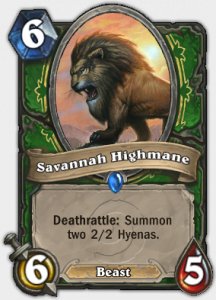Prior to my coaching session with Admirable I'd have said I was a solid if unspectacular Hearthstone player. Afterwards, I felt like I was actually a pretty terrible player, but I also felt more excited about the game than I had for a long while because I could see so many things I could improve. These are the three elements of my game I'm now working on...
1) Stop being obsessed with clearing the board
I am a doom-monger by nature, and that means that when I play Hearthstone I always assume my opponent has the perfect hand and panic as soon as they play so much as a Goldshire Footman. “You're focusing way too much on responding, and not enough on anticipation,” says Admirable. “At some point you have to create tension on the board.” The takeaway for me was being able to recognise when I was ahead, and then pushing my advantage home. In other words: it's often correct to ignore the opponent's creatures and go for face, the key is recognising when. For further reading, it's worth checking out the concept of “who is the beatdown?”, a theory which originated in Magic but applies perfectly to Hearthstone.

2) Consider your opponent's plan carefully
Whilst I understand how almost all traditional deck archetypes work, it turns out I suck at planning my strategy around them. “You're not anticipating what your opponent's going to do enough,” notes Admirable. “You don't understand your matchups.” What he means by knowing a matchup is that, say you're facing a Midrange Hunter, they will want to drop Houndmaster on a beast on turn 4, so don't leave a beast alive on the board. From turn 5 they can use the Starving Buzzard + Unleash The Hounds combo, so don't flood your own board, and so on. Obviously there are many permutations to consider, but once you develop a sense of what the other player wants to do, it's much easier to derail their plan and impose yours.
3) Don't change your own plan
Once you have a plan for how to win, stick to it. Too often I respond to something unexpected happening by trying to change my approach entirely. Again, the problem is panicking. “When you deviate from your gameplan, you really start getting stuck,” says Admirable. Sometimes there will be situations which necessitate a change of approach, but again the key is recognising when that's appropriate. Generally speaking, you're always better off executing a single clear strategy.
The other thing to remember is to stop taking losing so seriously. “You're going to lose a lot of games,” says Admirable. “That's the nature of it. In Hearthstone you have to lose. You should take any loss as an opportunity to think what could I have done to win? And if the answer is you could only have won by drawing a particular card, you should have played as if you were going to draw it, so that when you drew the card you were in a position to win the game. Even when you win you should be thinking could I have won faster? Could I have won more efficiently?”
Here's the thing though. In the next few days I don't lose much at all. In fact I quickly climb five ranks over the course of two days. Whilst I'm playing, I can feel myself thinking more calmly about what my opponent is trying to do versus my intentions. I also start finding it easier to recognise when I'm in the driving seat, and matchups I previously struggled with feel substantially less daunting. As I play I keep in mind an anecdote Admirable told me about a player close to Legend who got so scared of losing that he stopped playing Ladder entirely. Admirable evaluated his play, told him he wasn't doing anything wrong and just needed to get out there and go for it, and the guy immediately went 17-5 and hit Legend.
What kind of person uses a videogame coach?That won't work for everyone, though, and I'm still curious to know who these people are with money to burn on getting better at digital goblin battling. Maybe it's Wall Street guys who are playing Hearthstone while doing coke in their loft apartments. I ask Admirable if he's surprised people are willing to pay $125 an hour? “I definitely think it's unusual,” he replies, but insists there isn't a typical student. Some people want to get better at drafting in Arena, others just want a better winrate. The unifying trait is that they're all “people who very much understand the value of time.”
The biggest gaming news, reviews and hardware deals
Keep up to date with the most important stories and the best deals, as picked by the PC Gamer team.
So, could hiring a coach work for you? Well that very much depends on how much you value your time and money, but also how important getting better at this game is to you? I've got no doubt that working with a coach can have a huge impact on performance, but obviously finding the right person for you will be critical. There are cheaper alternatives too, like using screen share with a friend who's higher ranked to help evaluate your plays. I'd definitely consider using one in the future though.
Perhaps the best piece of advice Admirable gave me was this: “Instead of being the guy who's like 'oh shit, I'm fucked if my opponent does this...' be the guy who's fucking your opponent by doing something.” I want to be that guy, I tell him. “Sometimes you'll get fucked because your opponent has the perfect answer,” he continues, “but being proactive is almost always the right decision.”
*You can check out ThatsAdmirable's Twitch channel here or book him for coaching here.
With over two decades covering videogames, Tim has been there from the beginning. In his case, that meant playing Elite in 'co-op' on a BBC Micro (one player uses the movement keys, the other shoots) until his parents finally caved and bought an Amstrad CPC 6128. These days, when not steering the good ship PC Gamer, Tim spends his time complaining that all Priest mains in Hearthstone are degenerates and raiding in Destiny 2. He's almost certainly doing one of these right now.


